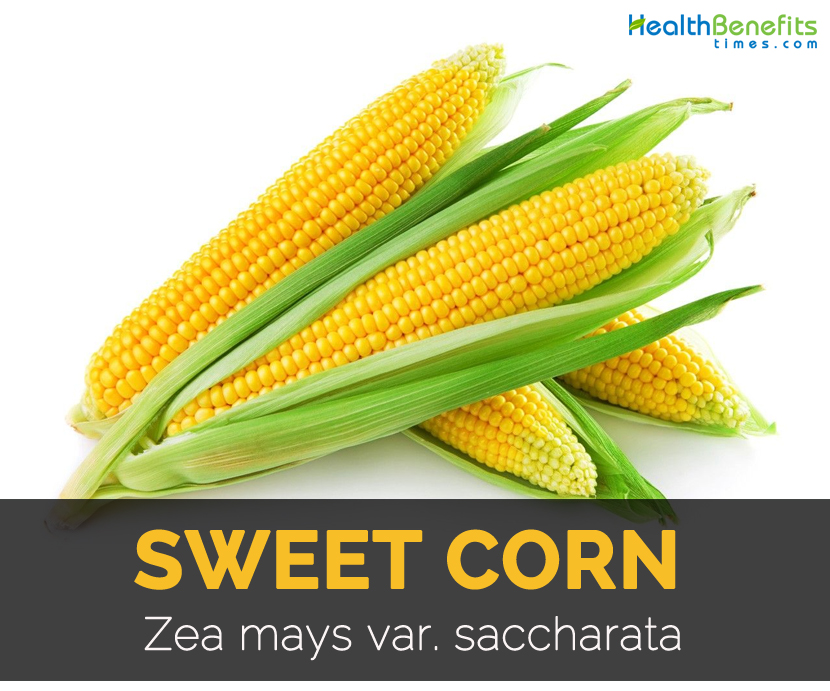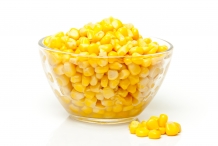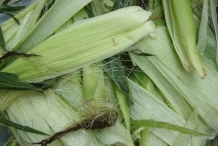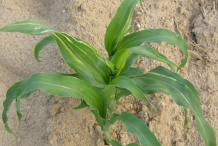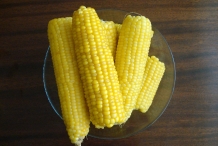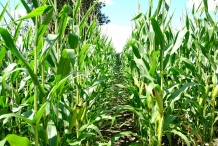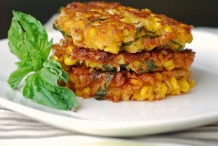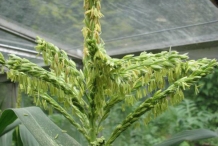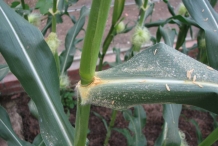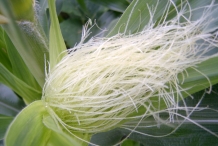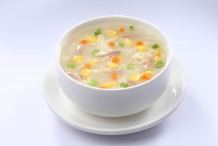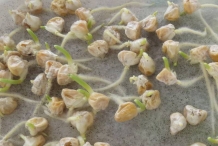| Sweet Corn Quick Facts |
| Name: |
Sweet Corn |
| Origin |
Mesoamerica |
| Calories |
125 Kcal./cup |
| Major nutrients |
Carbohydrate (20.85%)
Vitamin B5 (20.80%)
Vitamin B1 (18.75%)
Phosphorus (18.43%)
Vitamin B3 (16.04%)
|
| Health benefits |
Packed with calories, Contain B vitamin complex, Deal with anemia, Improvise cholesterol levels, Benefit of Vitamin A |
Sweet corn is one of the members of grass family Gramineae with wheat, barley and rice. It is inherent to tropical environment of Americas. Sweet corn is the sweet version of maize. Various varieties could be found, some have white kernels whereas others have combination of white and yellow kernels. The sweetness differs in varieties. Yellow sweet corn is the common variety. This cereal has high content of sugar. Sweet corn is an outcome of naturally occurring recessive mutation in genes restrain conversion of sugar to starch inside ENO of corn kernel.
This maize species differs genetically from field maize. The kernels are delicious, tender and consumed as vegetable in cuisines worldwide. Adjacent to traditional field corn, sweet corn crops are harvested when corn ears attain milky stage. Cob is either used immediately or frozen for using later as the sugar content convert into starch quickly. This crop has attained major success as one of the vital commercial cash crops in various tropical and semi-tropical countries including USA.
History
Sweet corn is an instinctive mutation in field corn and was cultivated by several Native American tribes. Sweet corn was given by Iroquois to European settlers in 1779. Then soon it was a popular food in Central and Southern regions of United States. Open pollinated cultivars started to became available widely in United States in 19th century. In 20th century, the production of sweet corn was influenced by various key developments.
Health Benefits of Sweet Corn
The health benefits offered by Sweet corn are in detail below:
- Packed with calories
Calories are essential to survive. Corn offers 342 calories in a serving size of 100 grams. It also has low content of glycemic index. Foods with high content of glycemic index such as white bread and white rice breaks down rapidly and causes blood sugar and jump of insulin level followed by active crashing of blood sugar levels. Sweet corn is absorbed slowly into bloodstream result in stabilizing blood sugar level.
- Contain B vitamin complex
Sweet corn has high content of B vitamin constituents such as niacin and thiamin. Thiamin is required to maintain proper nerve health as well as cognitive function. Niacin helps to promote good cholesterol and lowers the chances of cardiovascular problems. Insufficient niacin causes Pellagra which is a disease indicated by dementia, diarrhea, insomnia, dermatitis and inability to sleep.
Sweet corn contains pantothenic acid which is considered to be an essential vitamin for protein, carbohydrate and lipid metabolism in the body. Folic acid assists in production of healthy red blood cells and prevent anemia. Additionally, it is required to aid rapid cell growth and division such as during pregnancy and infancy. In pregnant women, the deficiency of folic acid results birth of underweight infants and results neural tube defects in newborns.
- Deal with anemia
Anemia is an insufficient amount of red blood cells or amount of hemoglobin in blood. Folic acid and Vitamin B12 helps to prevent the chances of anemia caused by deficiency of vitamin. Corn is a great source of iron which is required for the formation of new red blood cells.
- Improvise cholesterol levels
Niacin is essential for good cholesterol and lowers the chances of cardiovascular ailments. Corn husk oil helps to lower bad cholesterol. It helps to lower the risk of heart problems and atherosclerosis.
- Benefit of Vitamin A
Sweet corn has high content of beta carotene; forerunner to Vitamin A. Beta carotene is turned into Vitamin A and provides maintenance of skin and vision. Vitamin A also assists mucus membranes and promotes immune system. Beta carotene is not transformed into Vitamin A which acts as an antioxidant and counteracts heart disease and cancer.
- Care for skin
Corn starch is used in various cosmetic products and also applied to skin for soothing irritation and rashes. Corn products are used to restore carcinogenic petroleum products that are major constituents of cosmetic preparations.
- Counteract cancer
Study shows that corn is loaded with antioxidants which counteract cancer causing free radicals and urge apoptosis in cancerous cells without affecting healthy cells. High content of ferulic acid acts as anticarcinogenic agent which is effective in counteracting tumors that lead to liver and breast cancer. Purple corn has anthocyanins which eliminate cancer causing free radicals.
- Diabetes prevention
Sweet corn has vitamin B which regulates lipid, protein and carbohydrate metabolism and phytochemicals regulate release of insulin. Sweet corn possess glycemic index of 58 which is a smart choice for diabetic people. Phenolic phytochemicals found in it also control hypertension.
- Delay aging process
Sweet corn is a perfect for those who want to maintain their youthful looks and remain young. It has high content of antioxidants which prevent and also slows down aging process.
- Enhance vision
The kernels of Sweet corn have beta carotene which forms vitamin A promoting better vision. Carotenoids also help to lower macular degeneration that impairs vision at center of line of sight.
https://www.youtube.com/watch?v=mtaO-VXHRu8
Side effects of Sweet corn
- Upsets stomach
Corn is a great source of fiber and other essential nutrients that supports to flush harmful toxins and unwanted substances for the body. Excess fibers could be harmful for stomach health. The consumption of excess cereals causes stomach cramps and indigestion.
- Cause diarrhea
Raw sweet corn causes diarrhea and various intestinal disorders. One should consult the doctor if some symptoms are experienced.
- Allergic reactions
Corn causes allergies and symptoms such as rashes on skin, vomiting, swelling of mucous layer. People might experience asthma attack and anaphylaxis after having corn. Allergies are caused due to ingestible proteins found in sweet corn.
- Chances of pellagra
Sweet corn is a predominant food. The excessive consumption of corn causes the chances of pellagra. Pellagra is due to vitamin deficiency such as niacin in the body. Corn lacks amino acids and niacin for supporting body from pellagra.
- Negative effect for diabetic people
Corn has negative effect on people with diabetes as it promotes the level of blood sugar in the body. Corn has high content of carbohydrates which helps to improve blood sugar level. People with diabetes should not consume corn in high quantities.
- Cause flatulence and bloating
Corn has high content of starch. The sweet corn breaks down in large intestine and produce gas. The people who consume large quantities of corn cause flatulence and bloating.
- Osteoporosis
People with corn diet might suffer from osteoporosis as sweet corn has low content of calcium. It is possible when one is not supplemented with adequate calcium food.
- Cause weight gain
Corn has high content of carbohydrate and sugar. Overconsumption of maize could cause gain in weight. People on diet should avoid the consumption of corn.
- Cause tooth decay
Corn has sugar which ruins teeth. One should follow oral hygiene and brush the teeth after consumption of corn.
- Lethargy
Corn has adequate starch which causes drowsiness and lead to lethargy.
Storage
- Store sweet corn in a refrigerator without removing husk.
- Wrap the corn loosely in a dry plastic bag to keep it fresh for more than two days.
Traditional uses
- The leaf and root decoction is used to treat dysuria, strangury and gravel.
- Corn silks are demulcent, cholagogue, lithontripic, diuretic, vasodilator and mild stimulant. It lowers blood sugar level and used to treat diabetes mellitus, gonorrhea, cystitis and gout.
- Decoction of cob is used to cure nose bleeds and menorrhagia.
- Seed poultice is useful for swellings, ulcers and rheumatic pains and also in treating warts, tumors and cancer.
Precautions
- Allergic reactions are rare to sweet corns.
- One with high blood sugar levels should limit an intake of sweet corn as it has lots of simple sugars.
How to Eat
- Serve the cob whole or in chunks.
- Kernels are used like a vegetable.
- The section of cob is served as main dish.
- It could be steamed or boiled.
- Corncob (whole) is grilled and served with lemon, salt and pepper seasoning.
- Steam the whole cob or boil it in salt water and serve with oil or butter.
- Accompany the boiled kernels to pizza, salads, risotto, omelets, stews, rice pilaf and fried rice.
- The water used to boil cob is used with carrots, onion, parsnip and celery stalks for preparing vegetable stock.
- Season the boiled corn cob with salt and pepper.
- Dried mature seeds are grounded into flour and used as a thickening agent in foods such as custards.
- Make a salad with thinly sliced cucumbers, red onion, beets and scatter corn kernels over it and dress with lemon juice.
- Use it as an ingredient in casseroles, stews, breads, relishes and puddings.
- Sweet corn could be microwaved, baked and barbecued.
Other Facts
- First corn was grown more than 7,000 years ago by Native Americans in Central America.
- Native Americans used sweet corn leaves as chewing gum.
- Corn is cultivated on every continent except Antarctica.
- Each kernel on cob has one strand of silk.
- About 14000 pounds of sweet corn is produced in on acre of land.
References:
http://www.processvegetables.co.nz/our-documents/sweetcorn/
https://www.agmrc.org/media/cms/budgetsheets_sweetcorn2FINAL_697315E3311E0.pdf
https://en.wikipedia.org/wiki/Sweet_corn
https://www.bbcgoodfood.com/glossary/sweetcorn
http://www.eatingwell.com/article/111076/is-corn-healthy-or-not-5-myths-about-sweet-corn-busted/
https://www.nutrition-and-you.com/sweet-corn.html
https://cals.arizona.edu/fps/sites/cals.arizona.edu.fps/files/cotw/Sweet_Corn.pdf
https://www.ufseeds.com/product-category/vegetables/corn-seed/sweet-corn-type/
https://www.cabi.org/isc/datasheet/58357
http://www.naturalmedicinalherbs.net/herbs/z/zea-mays=sweet-corn.php
https://www.tarladalal.com/glossary-sweet-corn-kernels-156i
http://www.sweetcornfest.com/sweet-corn-fun-facts/
https://www.yabibo.com/10-incredible-side-effects-of-sweet-corn/
https://www.dovemed.com/healthy-living/natural-health/7-health-benefits-of-sweet-corn/
Comments
comments


